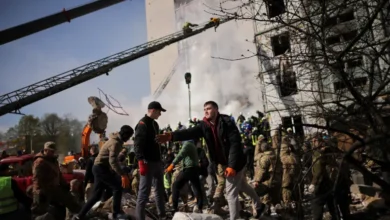What’s next for Netanyahu after top court ruling against judicial overhaul?

The Israeli Supreme Court has struck down a controversial law that Prime Minister Benjamin Netanyahu’s coalition government has been pushing for months – but caused uproar and prompted thousands of people to take to the streets in defiant protest.
That decision is being seen as a blow to the coalition government which promised to enact sweeping changes that would curb judicial powers but has suffered deep divisions since being sworn in, late in 2022.
Those fissures appear to have only deepened, with the top court’s ruling made as Israel wages a devastating war on Gaza that has already killed more than 22,000 people in the besieged enclave, more than a third of them children.
So what is the controversy about – and what is next for Israel and Netanyahu?
What was the law about?
The law was the only one from a package of judicial overhauls by Netanyahu’s government that aimed to limit the Supreme Court’s powers concerning the executive.
Since Israel does not have a constitution, it relies on a set of Basic Laws and the legislation in question was an amendment to an existing provision that allowed the Supreme Court to overrule laws that, in its view, did not pass a “reasonableness” test.
The new law eliminated the top court’s ability to block laws using that test. Other laws that are part of the planned judicial overhaul would give the Knesset, Israel’s parliament, more power to appoint Supreme Court judges.
Before being passed in July, and even after that, the law saw swift and intense opposition in Israel, with thousands of people in Israel and abroad demonstrating for several weeks on end. Thousands of army reservists also threatened to quit.
Detractors say the law removes a crucial checks and balances component of Israeli democracy needed in a country with a fragile legal system. Many Israelis also said the amendment weakens the independence of the judiciary at a time when the country is being run by its most far-right and most religiously conservative coalition yet.
What did the Supreme Court say?
In a vote on Monday, 12 of 15 Supreme Court judges ruled for the first time that the court had the power to strike down Basic Laws.
Eight judges further voted to nullify this specific “reasonableness” amendment. It is the first time the court will nullify a Basic Law or an amendment to one.
In a case summary, the Supreme Court said the government’s passing of the law “completely revoked the possibility of carrying out judicial review of the reasonableness of decisions made by the government, the prime minister, and the ministers,” and added that letting the law stand could cause “unprecedented and severe harm” to Israel’s democracy.
Netanyahu’s government has always claimed the law is needed to create balance in government branches and to diversify the bench which it sees as putting minority interests before national ones.
But some see the push for the law as an attempt by Netanyahu to avoid sentencing in a drawn-out corruption trial in which he faces charges of bribery, fraud and breach of trust. Those proceedings were suspended following the start of Israel’s war on Gaza, but resumed early in December. Netanyahu has denied any wrongdoing.
What’s next?
Netanyahu’s Minister of Justice Yariv Levin, who has shepherded the controversial laws, including the one that the court has struck down, hit out at the judges, insisting that the ruling would not “stay our hand”.
Levin also said that the decision by the court to publish its ruling while Israel’s war on Gaza was continuing is “the opposite of the unity required these days for the success of our fighters on the front.” Likud, Netanyahu’s party, said the decision was “unfortunate”.
Yet, if the government decides to ignore the Supreme Court ruling, it could end up destabilising the wartime coalition that is leading Israel’s assault on Gaza.“The verdict must be respected, and the lesson from the conduct of the last year must be internalised – we are brothers, we all have a common destiny,” he wrote on X. “These are not days for political arguments, there are no winners and losers today. Today we have only one common goal – to win the war, together.”“The verdict must be respected, and the lesson from the conduct of the last year must be internalised – we are brothers, we all have a common destiny,” he wrote on X. “These are not days for political arguments, there are no winners and losers today. Today we have only one common goal – to win the war, together.”











